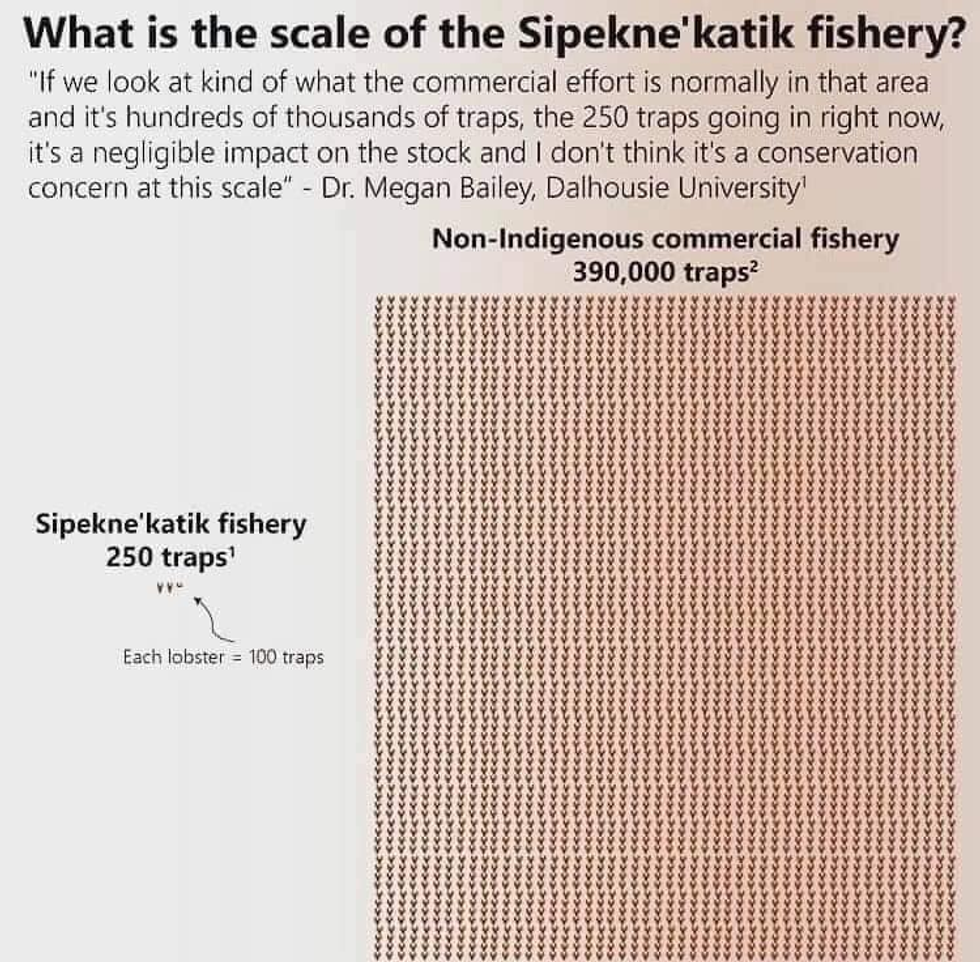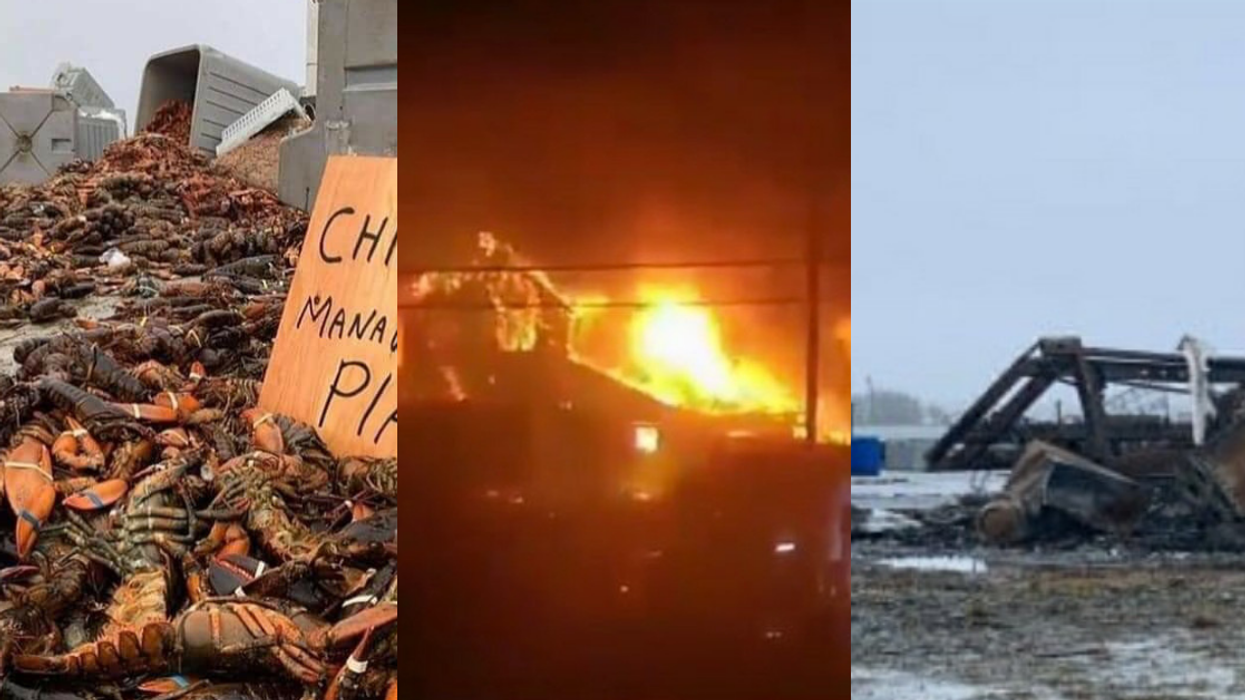As Mi'kmaw fishermen in what is now Nova Scotia, Canada exercised their treaty rights, they were met with escalating attacks from commercial fishermen who claimed honoring treaties signed with the Mi'kmaq—plural of Mi'kmaw—was unfair. The mostly White commercial fishermen began by organizing—via social media—targeted harassment with flairs and fireworks.
After the initial attacks went unchallenged by the RCMP—Canada's law enforcement agency—the violence escalated to laying spike strips on the roads, vandalizing vehicles, cutting trap lines, dumping lobster catches, fires and physical assaults.
RCMP are letting Mi'kmaw fishers down in "standing by" in face of colonial violence: https://t.co/LT4fa4vcZG
— Sean Carleton (@SeanCarleton) October 19, 2020
The Mi'kmaw fishermen used video and social media to get the word out to the rest of Canada and the world to try to force a response from the government.
From instagram, here is footage showing settlers in “Nova Scotia" building spike strips to damage Mi'kmaq vehicles. This has to be stopped. pic.twitter.com/ILDh0osbpk
— wolfmandrew (@andrewneville) October 15, 2020
This is a disgusting and cowardly and violent act. White fishermen broke into the #MikMaq lobster storage facility and destroyed thousands of pounds of live lobster in "protest." These are the men crying #conservation. #fridaymorning pic.twitter.com/Bctiy5nb80
— Jeff Barnaby (@tripgore) October 16, 2020
Here's a couple photographs of what's been transpiring today. The racist mob of fishermen cut lobster traps off of the buoys.
They left the traps on the bottom and the buoys floating.
Some of the buoys were shot with some kind of buckshot. pic.twitter.com/gOoUKNa1so
— Agent NDN (@TheAgentNDN) October 17, 2020
so much violence in the past month: driving boats dangerously close, equip sabotage, physically attacking a Chief, intimidation, burning a boat & van, road spikes, verbal abuse, raids, etc. all while settlers control 99.93% of the traps. @CBCNews could mention this is yr stories. https://t.co/wtzre1gufZ
— #MarcEmery is a predator #420Vancouver (@allthpcesmatter) October 17, 2020
#MikmaqRights https://t.co/kWkblmzpFs
— JustAnAverageHuman (@JustAnAverageH2) October 18, 2020
EXCLUSIVE: White Supremacists continue their harassment and surveillance of Indigenous people at the fishery in Southern Nova Scotia.
Area residents complain that the police are not doing enough to stop the intimidation tactics from the right-wing-fanatics. #NovaScotia pic.twitter.com/YGMqtrb88J
— Toronto Today (@Toronto__Today) October 16, 2020
Background on what is happening in Nova Scotia to the Mi'kmaq people pic.twitter.com/N71aMvpRNH
— Notanotherblacklife (@notanotherblk) October 17, 2020
Eventually some arrests occurred.
RCMP charge N.S. man after assault on Sipekne'katik First Nation chief https://t.co/D5JXQmeJQz
— CBC Indigenous (@CBCIndigenous) October 17, 2020
But Indigenous leaders in Canada and the United States and allies say it's not enough.
If you think what is happening in Canada is part of a whole system of racism in North America, please RT. #MikmaqRights #ChristopherColumbus https://t.co/HaOK8mBXM8
— Mark Ruffalo (@MarkRuffalo) October 18, 2020
Genocide:
How it How its
started going pic.twitter.com/qqJgGtwh2Q
— BeadsAgainstFascism (@beadagainstfash) October 16, 2020
It goes without saying but must be said that if this were the other way around & Mi'kmaw people were threatening lives of non-native fishermen we'd see DFO RCMP & DND storming Mi'kma'ki & violently arresting Mi'kmaw people. Do better @JustinTrudeau https://t.co/mPbuxo89S1 pic.twitter.com/cpJ9txF4Cw
— Pam Palmater (@Pam_Palmater) October 15, 2020
I support #MikmaqRights
If First Nation people were attacking white folks and burning their boats and property, this would be treated differently by the @rcmpgrcpolice and the media.#racism in Canada.@JustinTrudeau - protect the Mikmaq people.
— Kevin Colwell (@WrathofKC) October 18, 2020
This is terrorism.
The Mi'kmaq people desperately need help now
No more empty words, @justintrudeau. This must be stopped.https://t.co/WBVPIDQLrb
— Jagmeet Singh (@theJagmeetSingh) October 17, 2020
I can't bodily be there but I would if I could b/c the white terrorism is escalating. It's not abstract, people are being hurt, their livelihoods destroyed, all because white people being white.
Mi'kmaw are merely exercising their Treaty rights. https://t.co/qQUHBzpfD6
— WalkingInAustin (@WalkingInAustin) October 15, 2020
They were followed, threatened & barricaded
Their vehicles were torched & their livelihoods destroyed
A mob threatened to burn them out
The response? RCMP stood idly by & Justin Trudeau tweeted but offered no solution
L'nuk (Mi'kmaw) fishers deserve justice & dignity now https://t.co/cAUwrrfqJe
— Jagmeet Singh (@theJagmeetSingh) October 15, 2020
Hey CBC: This is not a “dispute." Mi'kmaw have the responsibility and the right to harvest. There is no “dispute" abt this. Call it like it is: colonial violence. pic.twitter.com/1JjhM6GVzI
— Damien (@damienlee) October 15, 2020
I, a settler, am able to practice my culture because of the Mi'kmaq—on their land. It's about damn time we start defending their right to do the same. I support Mi'kmaw fishermen—yesterday, today, tomorrow, and every friggin' day after.
— Siobhan Supports Treaty 1752 (@scbeaton) October 17, 2020
The Mi'kmaw people in Canada are literally under attack for exercising their constitutional right to fish under Treaty law. This right was upheld by Canada's highest court yet the Canadian government remains silent & allows this settler violence to continue. https://t.co/3Xh1sT1sgA
— Ruth Hopkins ⚡️❤️⚡️ (@Ruth_HHopkins) October 15, 2020
Under treaty, Mi'kmaq people are allowed to fish outside of the government regulated fishery season in order to earn a “moderate livelihood"—a right that was upheld in a 1999 Supreme Court decision.
White settlers are pissed that Mi'kmaq people are enacting their treaty rights.
— Dallas Goldtooth (@dallasgoldtooth) October 17, 2020
It all comes down to treaty rights.
When Europeans arrived in North America with the intent to colonize the continent, they encountered people who had lived there for tens of thousands of years. Various tactics were used by early European settlements to establish colonies where an Indigenous population lived.
But as colonies became their own governments—separate from Europe—the genocide employed previously wasn't always feasible. In such cases, colonial and eventually national governments negotiated legally binding treaties with the tribes living on land they wanted.
While most treaties were broken in both the United States and Canada, the terms are still binding. The courts in both countries have awarded large settlements to compensate tribes for unceded lands.
If your criticism of the Mi'gmaw treaty fishery stems from your firm and unexamined belief that Mi'gmaq are Canadians, just know that you are wrong and no amount of being upset about it is going to magically transform us into Canadians.
We have quillwork older than your country.
— Agent NDN (@TheAgentNDN) October 16, 2020
It's so frustrating, as an historian of Indigenous-settler relations, to hear fellow settlers say that treaties give Indigenous peoples “special privileges." Without those treaties, settlers wouldn't have the “special privilege" of living here. We need more treaty education.
— Sean Carleton (@SeanCarleton) October 17, 2020
What I was trying to get at in my original tweet is this: the lack of meaningful treaty education and historical understanding about Indigenous-settler relations only further fuels settler ignorance and anti-Indigenous racism...
— Sean Carleton (@SeanCarleton) October 19, 2020
Unceded means that tribal nations never sold ceded or legally signed away their treaty lands to the government. In addition to land, many treaties included hunting, fishing and water rights.
In the treaty with the Mi'kmaq, they may fish outside the timeframes set up by the government for the commercial fishermen to earn a "moderate income." It is this right that the commercial fishermen are protesting.
They claim the reason they cannot fish year round, conserving the fishery, should apply to the Mi'kmaq as well.
But how large of a bite do the Mi'kmaw take out of the fishery?

The Mi'kmaw were allotted 7 fishing licenses with each license for 50 traps. Of the 350 lobster traps allotted to them, Mi'kmaw have used only 250.
The commercial fishermen were licensed for 390,000 traps.
According to Indigenous Services Minister Marc Miller:
"It is and remains a tiny portion of the industry."
'It is and remains a tiny portion of the industry' says Indigenous Services Minister Marc Miller of the picture being painted of Mi'kmaw fishers and the lobster fishery. pic.twitter.com/d514fEt2dG
— APTN News (@APTNNews) October 19, 2020
Sipekne'katik First Nation has seven licenses. Each license has 50 traps, totaling 350 traps. Currently only 250 traps are being used.
The commercial fishery in the same zone allows for up to 390,000 traps.
View our ongoing coverage: https://t.co/X0RBJfHxtn pic.twitter.com/OaelcAMcUQ
— APTN News (@APTNNews) October 19, 2020
“Clearwater Lobster is fishing on unceded, unsurrendered, stolen lands and waters of the Mi'kmaq Nation. Over the last forty years, governments have favoured corporate fishing operations like Clearwater over small scale owner-operators and Mi'kmaq fishers." https://t.co/mCrNXry0ID
— Trevor © (@TSanipass) October 16, 2020
The Mi'kmaw fishers using their (Supreme Court-affirmed) treaty rights to fish year-round is not what harms lobster conservation.
Overfishing is done by Clearwater, and other HUGE companies, that drive up demand for fish & lobster while amassing mega-profits.
— Kathryn LeBlanc (@Kat_LeBlanc) October 17, 2020
Perry Bellegarde, national chief of the Assembly of First Nations, stated it's time for the RCMP, as well as federal and provincial governments, to intervene before someone is badly injured or killed.
Bellegarde added:
"This has never been a commercial disagreement, and the actions of the non-Indigenous fishers are meant to harass and intimidate the First Nations with whom they share the waters and the resources within them."
The 21-year-old Supreme Court of Canada ruling—the Marshall decision—affirmed the Mi'kmaw right to operate a moderate livelihood fishery. The court said the federal government could regulate the Mi'kmaw fishery but must justify any restrictions it placed on it.
No such restrictions have been defined by Ottawa. Mi'kmaw fishermen in Nova Scotia continue to call for the federal government to define and protect their treaty right to fish.
They still await a response from Prime Minister Justin Trudeau.








 The Benny Show
The Benny Show





 @neilforreal/Bluesky
@neilforreal/Bluesky @savannahcat/Bluesky
@savannahcat/Bluesky @qadishtujessica.inanna.app
@qadishtujessica.inanna.app @v-ron/Bluesky
@v-ron/Bluesky @nelnelnellie/Bluesky
@nelnelnellie/Bluesky @beatlenumber9/Bluesky
@beatlenumber9/Bluesky @pinkzombierose/Bluesky
@pinkzombierose/Bluesky
 @theunobsolete/TikTok
@theunobsolete/TikTok @theunobsolete/TikTok
@theunobsolete/TikTok @theunobsolete/TikTok
@theunobsolete/TikTok @theunobsolete/TikTok
@theunobsolete/TikTok @theunobsolete/TikTok
@theunobsolete/TikTok @theunobsolete/TikTok
@theunobsolete/TikTok @theunobsolete/TikTok
@theunobsolete/TikTok @theunobsolete/TikTok
@theunobsolete/TikTok @theunobsolete/TikTok
@theunobsolete/TikTok @theunobsolete/TikTok
@theunobsolete/TikTok @theunobsolete/TikTok
@theunobsolete/TikTok @theunobsolete/TikTok
@theunobsolete/TikTok @theunobsolete/TikTok
@theunobsolete/TikTok @theunobsolete/TikTok
@theunobsolete/TikTok @theunobsolete/TikTok
@theunobsolete/TikTok @theunobsolete/TikTok
@theunobsolete/TikTok @theunobsolete/TikTok
@theunobsolete/TikTok
 @laysuperstar/TikTok
@laysuperstar/TikTok @laysuperstar/TikTok
@laysuperstar/TikTok @laysuperstar/TikTok
@laysuperstar/TikTok @laysuperstar/TikTok
@laysuperstar/TikTok @laysuperstar/TikTok
@laysuperstar/TikTok @laysuperstar/TikTok
@laysuperstar/TikTok @laysuperstar/TikTok
@laysuperstar/TikTok @laysuperstar/TikTok
@laysuperstar/TikTok @laysuperstar/TikTok
@laysuperstar/TikTok @laysuperstar/TikTok
@laysuperstar/TikTok @laysuperstar/TikTok
@laysuperstar/TikTok @laysuperstar/TikTok
@laysuperstar/TikTok @laysuperstar/TikTok
@laysuperstar/TikTok @laysuperstar/TikTok
@laysuperstar/TikTok @laysuperstar/TikTok
@laysuperstar/TikTok